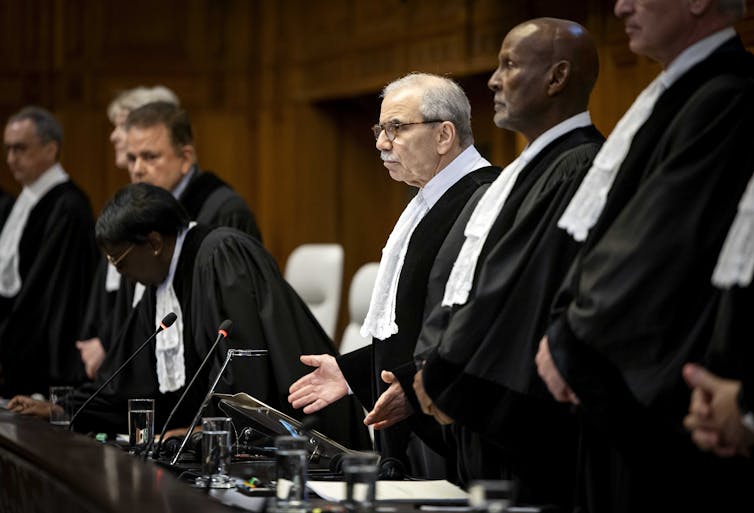The world has reacted with anger this week after an Israeli air strike on a safe zone for displaced civilians in southern Gaza reportedly resulted in the deaths of at least 45 people, including women and children.
This latest action in the Israel’s war in Gaza has come despite the International Court of Justice (ICJ) delivering an order last Friday that it must immediately halt its military campaign in Rafah due to the risk to civilians.
It appears Israel is determined to defy the ICJ’s order. Israeli tanks moved into the heart of Rafah earlier this week.
If it continues its assault on Rafah, it would present the ICJ (the UN’s top court) with perhaps the greatest challenge to its legitimacy since it was established following the second world war.

The ICJ view of the conflict
The court became directly involved in the conflict in December when South Africa lodged a case against Israel, arguing its offensive had amounted to or created the conditions for a genocide of the Palestinian people.
In late January, the ICJ issued a range of orders, including that Israel must take immediate steps to prevent acts of genocide against the Palestinian people and ensure humanitarian aid gets into Gaza.
Last week, the ICJ reiterated its concern over aid, and more critically, ordered Israel to:
Immediately halt its military offensive, and any other action in the Rafah governorate, which may inflict on the Palestinian group in Gaza conditions of life that could bring about its physical destruction in whole or in part.

There is a large amount of legal ambiguity in the wording of this order.
In one interpretation – favoured by the Israeli government – military and other actions in Rafah can continue, provided these actions are not genocidal.
In another interpretation, the order prohibits Israel from carrying out any further military or other actions in Rafah full-stop.
There’s also a question over how to interpret the word may. That is, at what point can it be said that Israel’s actions may lead to physical destruction?
While the order is ambiguous from a legal standpoint, arguably it is not to many observers: the court wants Israel to stop what it is doing.
The lack of enforcement
It is likely no accident the panel of judges provided such ambiguous orders.
The ICJ is an independent court, but it operates in a difficult political and diplomatic environment. Critically, it also has no independent ability to enforce its orders – there is no world police the ICJ can rely on to ensure its orders are carried out.
Instead, the court relies on the support of powerful countries that are willing to enforce its decisions through diplomatic measures, including sanctions.
Officially, the UN Security Council – as the global body responsible for peace and security – enforces ICJ decisions. However, in practical terms, the veto power of the five permanent members of the Security Council extends to the ICJ.
As such, the United States would likely veto any Security Council resolution to restrict Israeli actions in any substantive way.
While the US has warned Israel not to launch a major offensive in Rafah, a senior administration official has reportedly said this week’s air strike did not cross a “red line”.
This kind of roadblock to the enforcement of the ICJ’s orders threatens the legitimacy and credibility of the court. To exist as a trusted adjudicator in international law, it has to be seen to be applying that law impartially and fairly. And its rulings cannot be ignored.
The court alone can’t stop the fighting
In the past, the effective pursuit of states and individuals for breaches of international humanitarian law has required overwhelming political will, usually in the wake of the complete military defeat of a country at war.
This was the case with the Nuremberg and Tokyo war crimes trials following the second world war, and in other international trials since then. In these past cases, the nations and leaders in question were powerless to resist the overwhelming pressure of the international community.
When it comes to allegations of genocide and other breaches of international law, it is also much easier for judges on international courts and tribunals to make decisions after the events have occurred, rather than while they are still continuing, as in the Gaza war.
A government that legitimately holds power is likely to regard the orders of an international body as an encroachment on its sovereignty, as Israel does with the current orders of the ICJ and International Criminal Court.
Ultimately, what the conflict in Gaza and the various legal and political responses have shown is that no court in the world – nor any international law – alone has the capacity to effectively protect civilians during times of war.
Legal thinkers can debate the wording of the ICJ’s latest order, and political leaders can debate the power of the court, but the only thing that can end the war is widespread international pressure for both sides to agree to a ceasefire. This includes from powerful nations such as the US.
Thus, it is not the legitimacy of the ICJ that is most urgently in question at the moment, but rather how deeply the world’s most influential powers believe in the role of international institutions to maintain peace and security.

